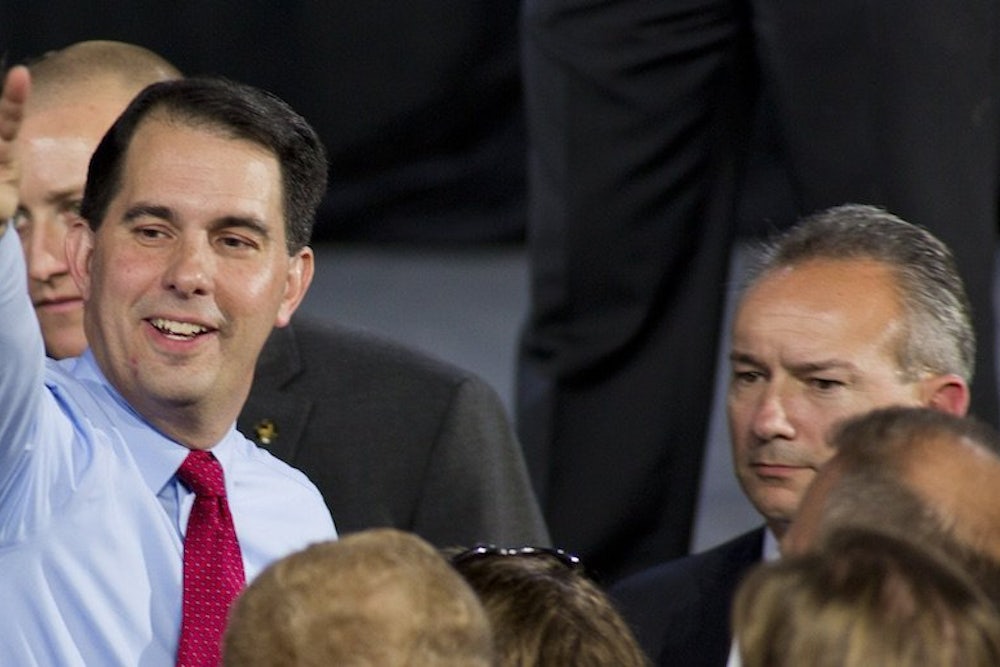Jeb Bush, Ted Cruz, Chris Christie, Scott Walker, and up to a dozen other potential 2016 presidential candidates are courting Iowa votes and donors at an agriculture summit hosted by major GOP donor Bruce Rastetter this weekend. The candidate who convinces Rastetter he will be Iowa agriculture’s strongest advocate might wind up with millions of dollars in super PAC money ahead of the caucuses.
Iowa's corn production gets a big lift from an ethanol mandate in the federal renewable fuel standard. A few of the candidates—Ted Cruz, Rand Paul, Marco Rubio—have already come out against the mandate, which could hurt their Iowa campaign (Paul and Rubio aren’t attending the forum.). But ethanol isn't the only issue that will be a liability for them. Iowa generates 27 percent of its electricity from wind, enough to power 1.4 million homes, according to a League of Conservation Voters memo. Iowans, business executives, and politicians are closely watching whether Congress renews the wind production tax credit (PTC), which lapsed at the start of this year.
Authored in 1992 by Iowa Sen. Chuck Grassley, the tax credit saves manufacturers 2.3 cents per kilowatt-hour of energy for their first ten years. Iowa Governor Terry Branstad, a Republican, backs the legislation’s renewal. Even Representative Steve King—a Republican who disagrees with Democrats on just about everything else—favors renewing the credit. “Conservatives can and do support wind,” he noted in a 2012 op-ed. “Wind’s PTC has long been backed on a bipartisan basis.”
But with Republicans controlling the House and Senate, the tax credit extension is in peril. The Republican Party is split on clean energy investments like the tax credit, and Cruz, Rubio, and Paul have all voted to end it. Any candidate standing against it risks losing support in Iowa.
In his 2012 campaign, Mitt Romney skewered renewable energy subsidies as “boondoggles” and a wind-powered economy as “an imaginary world.” This position against wind energy tax credits ended up hurting him. Grassley said Romney’s stand “felt it was just like a knife in my back, as the author of the bill, without even being consulted about it.” Branstad likewise criticized Romney and his campaign staff. “You’ve got a bunch of people that have put that website together that are bunch of East Coast people that need to get out here in the real world to find out what’s really going on,” he said.
The same might be said of the 2016 contenders. Charles Sharp is a Republican voter who employs 23 people at Heartland Energy Solutions, his Iowa wind turbine manufacturer. Originally, he planned to scale up his business this year and add another 67 jobs, but the uncertainty over the tax credit extension has prevented him from hiring anyone. Business has noticeably slowed, and if it continues he may have to start laying off workers. “If there’s hope the PTC and [investment tax credit] get renewed past 2015, I can go back to that thought process [of hiring again],” he said.
Coming out against wind energy tax credits amounts to a big risk in a crowded GOP field. And yet, presidential hopefuls have a strong incentive to oppose the legislation's renewal. While Iowa Republicans may back the policy, Charles and David Koch do not. Their main campaign arm, Americans for Prosperity, has actively campaigned for Congress to let the PTC expire, as have two groups linked to the Koch network, American Energy Alliance and Heritage Foundation. During debate on Keystone XL legislation in January, the three groups recommended the Senate vote against a wind energy amendment to extend the credit for five years. It did. In the last presidential election, the same groups promised to make wind energy too “toxic” for candidates to support. Candidates hoping to take Koch money know where their would-be benefactors already stand; Christie, Cruz, and Rubio attended a forum organized by the expansive Koch network in January.
Christie, Walker, and Bush haven't clarified exactly where they will fall on the credit's extension, so they have a tricky decision to make: They can come out in support of wind energy and risk losing Koch backing. Or, they can come out against it and risk losing Iowa.
